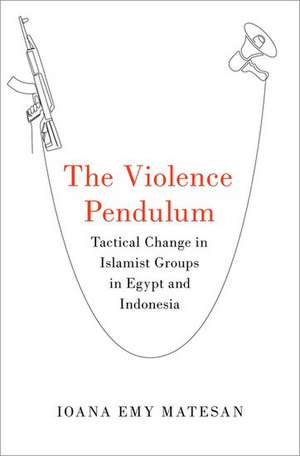The Violence Pendulum: Tactical Change in Islamist Groups in Egypt and Indonesia
Autor Ioana Emy Matesanen Limba Engleză Hardback – 6 oct 2020
Preț: 408.43 lei
Preț vechi: 528.39 lei
-23% Nou
Puncte Express: 613
Preț estimativ în valută:
78.22€ • 80.59$ • 65.53£
78.22€ • 80.59$ • 65.53£
Carte disponibilă
Livrare economică 22-28 ianuarie
Preluare comenzi: 021 569.72.76
Specificații
ISBN-13: 9780197510087
ISBN-10: 0197510086
Pagini: 288
Dimensiuni: 236 x 150 x 23 mm
Greutate: 0.57 kg
Editura: Oxford University Press
Colecția OUP USA
Locul publicării:New York, United States
ISBN-10: 0197510086
Pagini: 288
Dimensiuni: 236 x 150 x 23 mm
Greutate: 0.57 kg
Editura: Oxford University Press
Colecția OUP USA
Locul publicării:New York, United States
Recenzii
Emy Matesan'sanalysis of repression in Egypt and Indonesia could not be more timely given the increasing use of violence against civilians around the world by authoritarian governments. Explaining the connection between government repression limiting options for nonviolent tactics, she shows how they reinforce mistrust in the government and foster a desire for revenge. This groundbreaking study shows how groups move along the spectrum from radicalization and engaging in violence to disengagement and non-violent forms of resistance. Assessing the efficacy of these various tactics and highlighting the inherent pragmatism of even the most ideological leaders, Matesan's work is destined to be a classic in the study of violence and peaceful resistance.
A much-needed comparative analysis of how and why Islamist opposition groups shift between escalation and de-escalation, as their tactics evolve over time.The explanation expertly weaves together different causal threads to stress the importance of timing, the multiple pathways to violence and non-violence, and the relationship between principles and pragmatism in guiding the behavior of extremist groups. The book also serves as an important caution against reliance on repression to combat terrorism.
This carefully researched and richly detailed study explores the answers to one of the most vexing questions about extremist movements — why do they choose violence, and why do they abandon it? Taking the internal perspective of movements in Egypt and Indonesia, this book shows that these are strategic choices influenced by perceptions of opportunity and potential support. Its thoughtful insights into the pendulum of violence and nonviolence have global implications for understanding the dynamics of extremist movements around the world.
A much-needed comparative analysis of how and why Islamist opposition groups shift between escalation and de-escalation, as their tactics evolve over time.The explanation expertly weaves together different causal threads to stress the importance of timing, the multiple pathways to violence and non-violence, and the relationship between principles and pragmatism in guiding the behavior of extremist groups. The book also serves as an important caution against reliance on repression to combat terrorism.
This carefully researched and richly detailed study explores the answers to one of the most vexing questions about extremist movements — why do they choose violence, and why do they abandon it? Taking the internal perspective of movements in Egypt and Indonesia, this book shows that these are strategic choices influenced by perceptions of opportunity and potential support. Its thoughtful insights into the pendulum of violence and nonviolence have global implications for understanding the dynamics of extremist movements around the world.
Notă biografică
Ioana Emy Matesan is Assistant Professor of Government and Tutor in the College of Social Studies at Wesleyan University. Her research focuses on contentious politics and Islamist movements, with a particular interest in Middle East politics, political violence, and democratization. Her articles have appeared in numerous journals, including International Negotiation, Journal of Global Security Studies, Nations and Nationalism, Studies in Conflict and Terrorism, and Terrorism and Political Violence.
